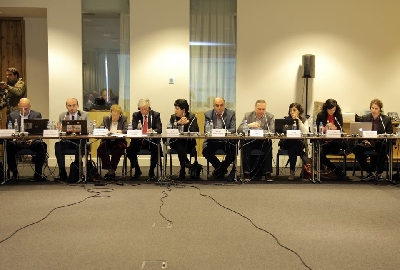Nino Akhobadze
In the first quarter of 2014 Institute of Social Studies and Analysis conducted a survey in the penitentiary establishments of Georgia under the order of Open Society Georgia Foundation; the purpose was to conduct large-scaled qualitative survey of torture and inhuman treatment practice in Georgian prisons in the period of 2003-2012.
Local nongovernmental organizations participated in the survey; among them were: Human Rights Center, Youth for Justice, Article 42 of the Constitution, Public Advocacy, Georgian Young Lawyers’ Association and others.
According to the report prepared as a result of the survey, the purpose was to expose practice of torture and inhuman treatment of prisoners in penitentiary establishments from 2003 to present; also, to analyze the goal and context of similar practice.
Both former and current prisoners were interviewed. Total 1199 prisoners were questioned; 598 of them are still in prison and 601 were former prisoners. The respondents were randomly selected from different penitentiary establishments. The interviews were conducted in person with guaranteed anonymity of the respondents.
During interviews, the respondents were asked to subjectively evaluate the crime they had committed and not in accordance to the articles under which they were judged. 23%-20% of them claimed they had not committed the crime they were convicted for.
Drug-addiction, thievery and robbery were the most frequent crimes for what the interviewed former and current prisoners were judged for.
The survey shows that majority of the interviewed people – 74% were well-informed about torture and inhuman treatment facts in the penitentiary establishments before those facts were made publish – before famous video-footage was aired by TV-Companies.
The survey results show that torture and inhuman treatment practice was wide-spread not only in penitentiary establishments but in different institutions too, like: police detention settings, police offices and security detention setting, so called Moduli building.
Respondents complained about physical and psychological torture, inadequate medical service and inhuman, degrading treatment of prisoners.
“3/4 of the respondents claim they were physically tortured; 84, 2% of them said they were victims of psychological torture.”
The survey showed that facts of physical and psychological torture occurred in different penitentiary establishments and institutions.
“The stories told by respondents disclosed that physical and psychological torture was not wide-spread practice only in concrete penitentiary establishments or institutions; in fact it was wide spread practice in the prisons throughout Georgia. However, it should be noted that 54% of physical torture cases occurred in Gldani Prison,” the report reads.
39% of respondents, who said they were physically tortured during imprisonment terms, claim that it happened almost every day. 64% of prisoners, who were victims of psychological torture, state that it happened almost every day. Majority of former and current prisoners said that main purpose of torture and inhuman treatment in penitentiary establishments was to instill overall fear among prisoners and to subjugate them; as for the purpose of photo/video recording and documenting of the torture and inhuman treatment facts, the respondents name several factors, such as: to coerce the prisoner and his/her family members to do something; to degrade prisoners; to insult them; torturers and organizers of torture facts enjoyed the process.
The survey lists methods of physical and psychological torture, which were most often used in penitentiary establishments. Majority of former and current prisoners said imprisonment caused their psychic disorder and different diseases, disability and relation problems with family members.
Majority of former and current prisoners claims they have never or almost never met human rights defenders, representatives of Public Defender’s Office, international or inter-governmental organizations and state-funded lawyers. Even if they met anybody, prisoners refrained from speaking about torture and inhuman treatment facts. They say it could not change anything; just the opposite they could have been punished after the meeting.
After the torture and inhuman treatment facts were made public, representatives of previous government of Georgia claimed they had no information about the problem and that similar facts did not frequently occur. However, the survey shows that respondents claim the opposite.
“Significant majority (70,2%) of the interviewed prisoners share the opinion that torture and inhuman treatment was part of the penitentiary policy of the government and not the initiative of the prison administration or individual employees of penitentiary establishments” the report reads.
Majority of respondents said after the 2012 Parliamentary Elections, facts of torture and inhuman treatment were partly or completely eradicated in the penitentiary establishments.
News
December 13, 2023
Ethnic minorities outside the peace dialogue
November 6, 2023
‘Peace’ agenda of political parties
Popular
Articles
February 13, 2024




